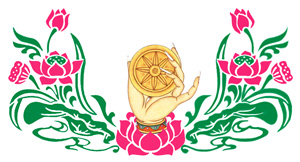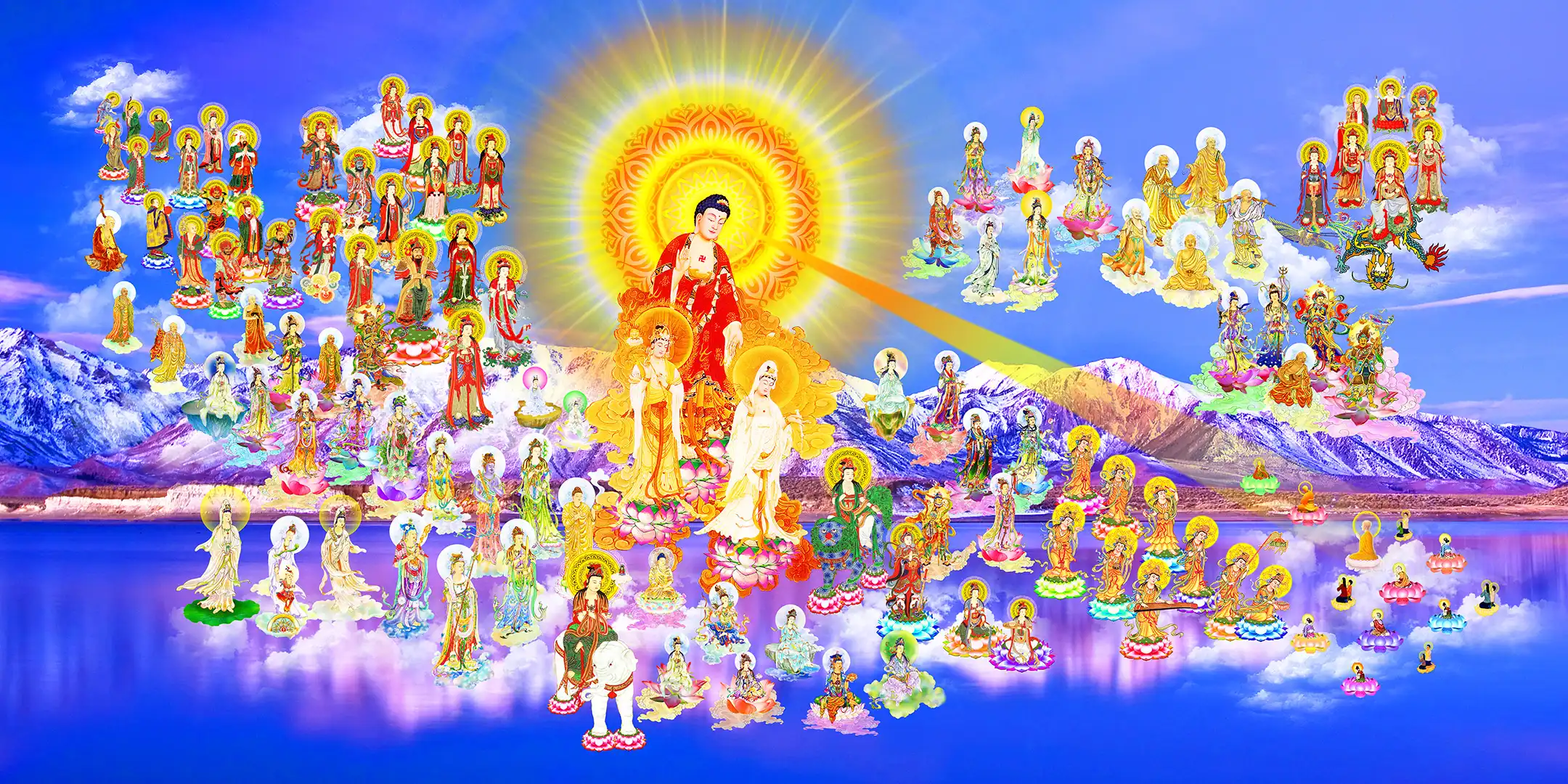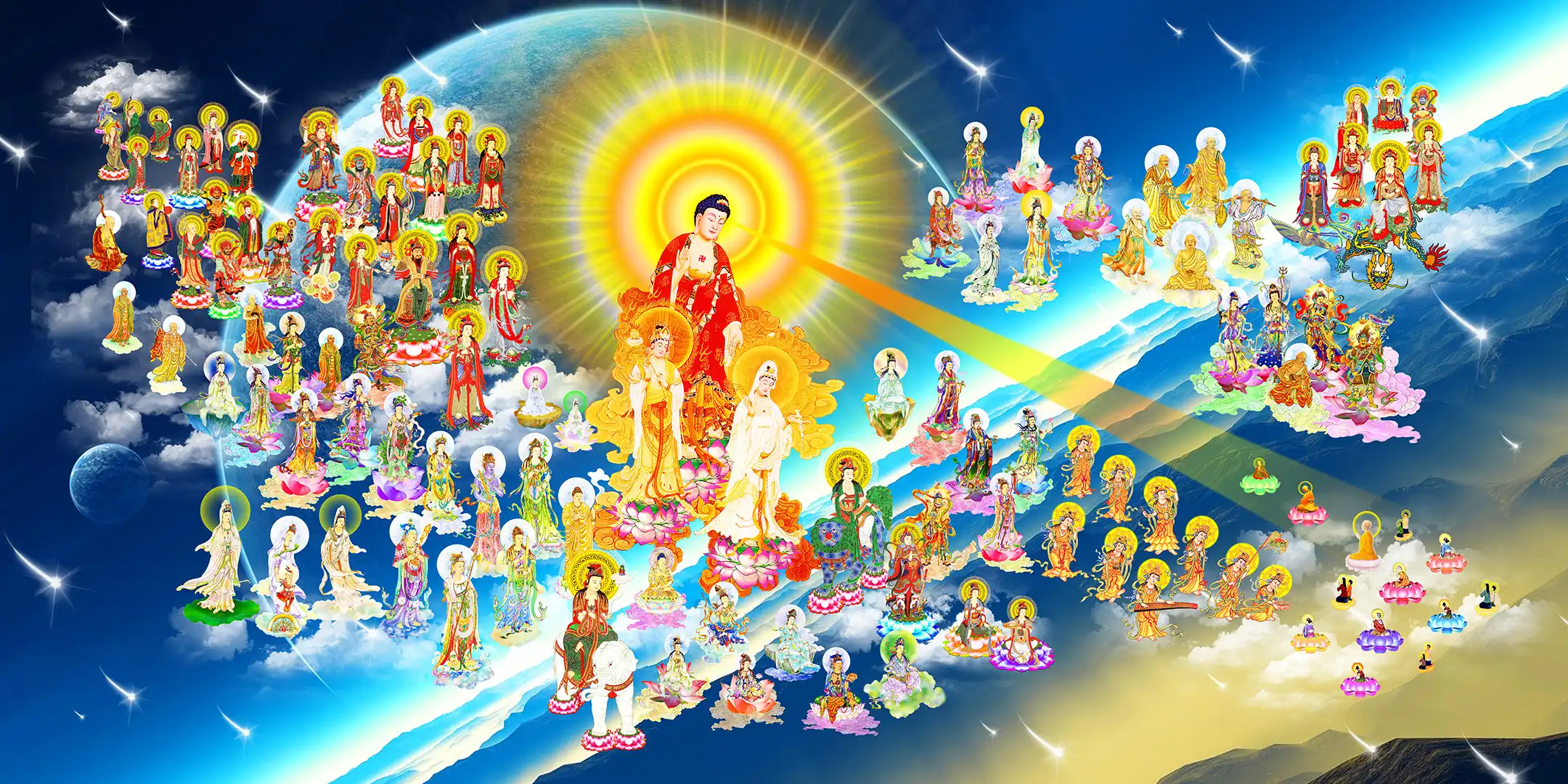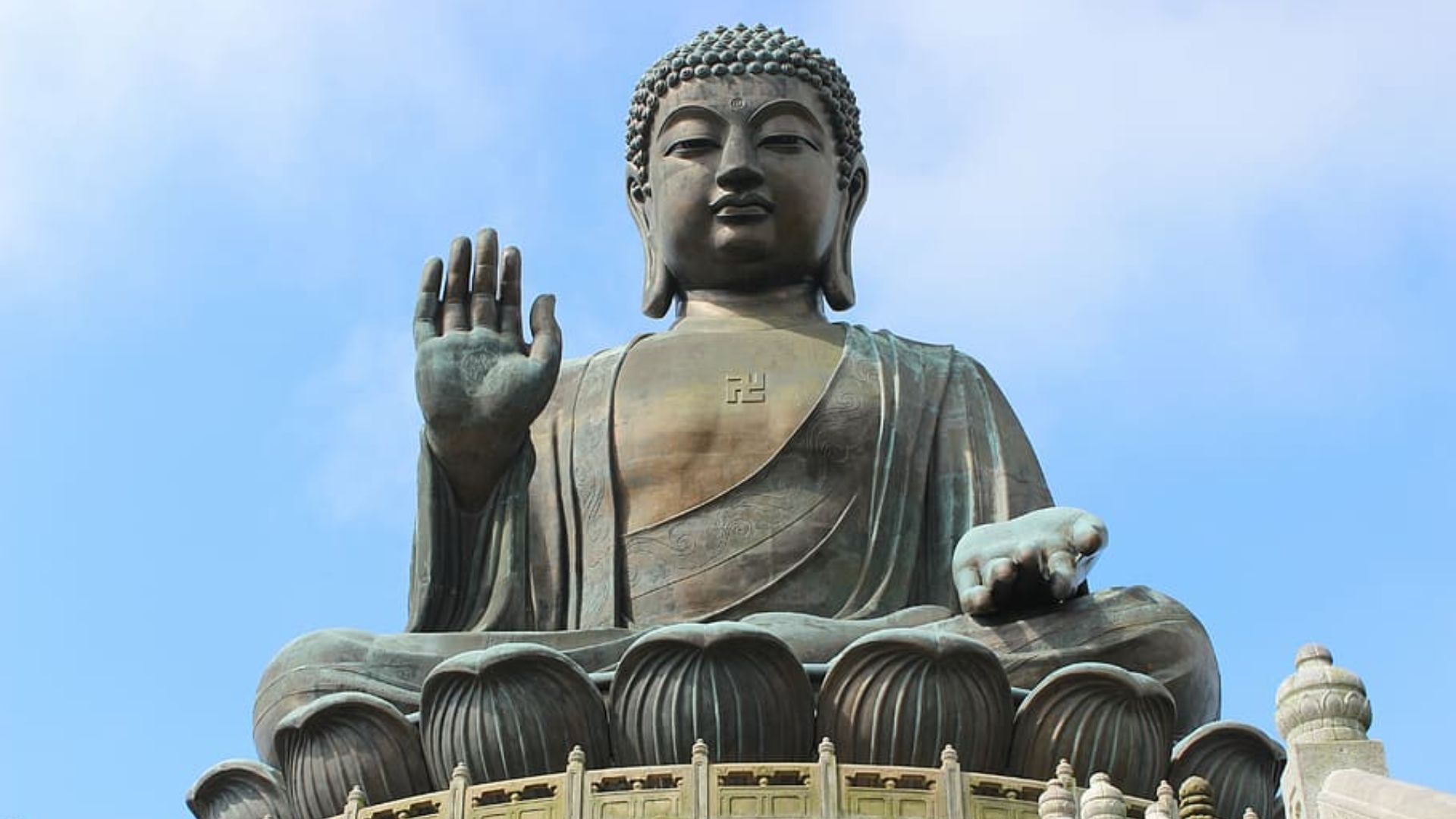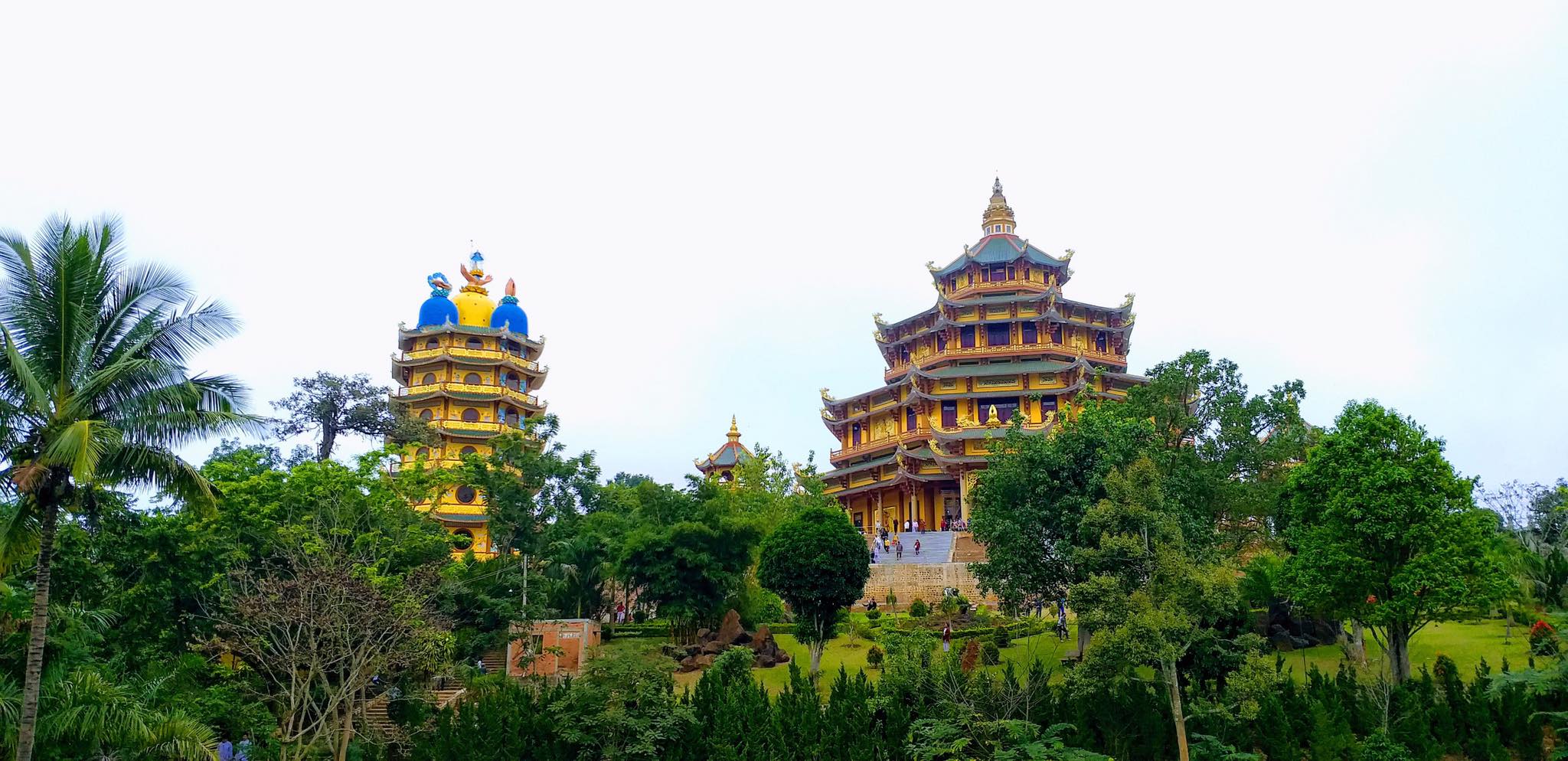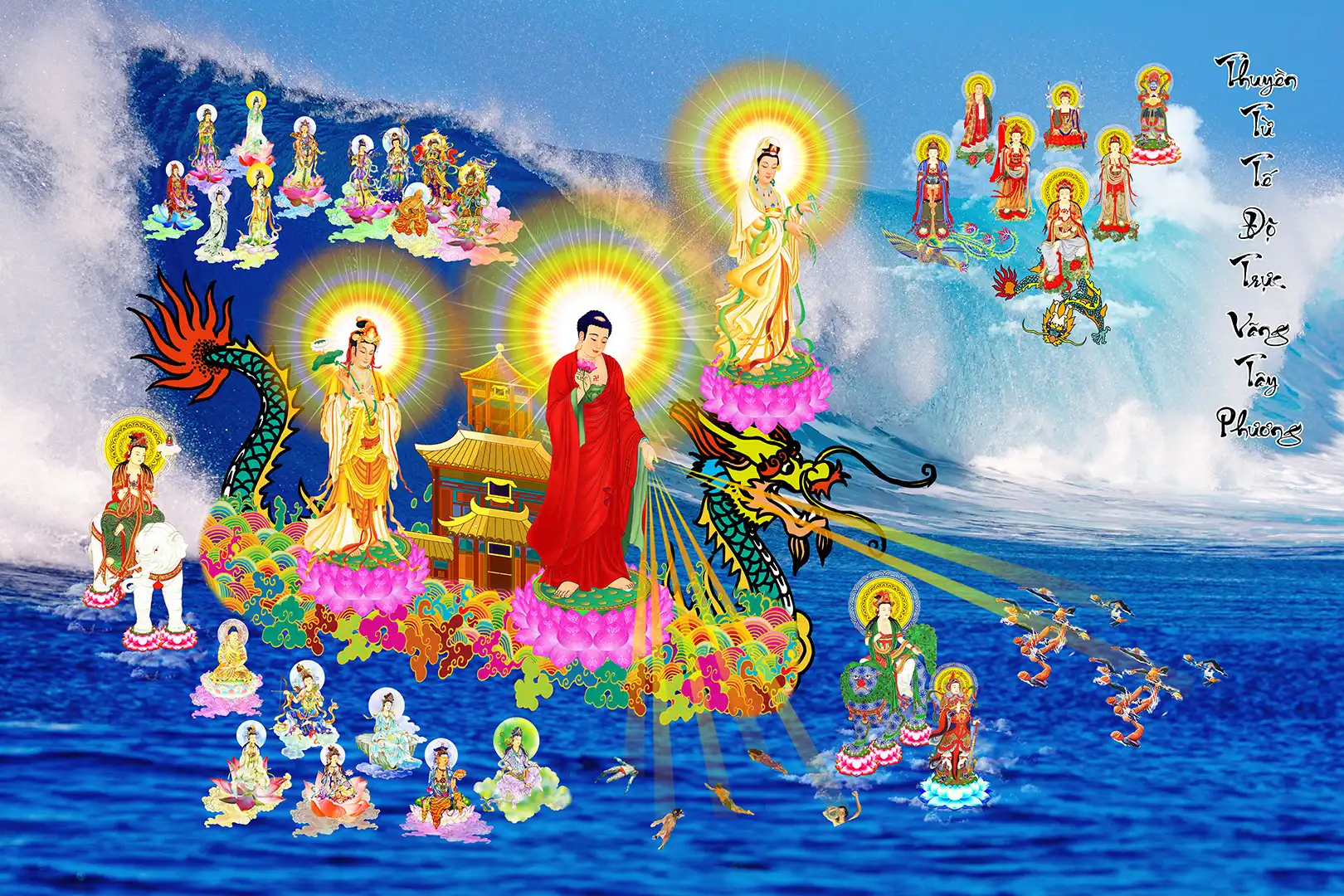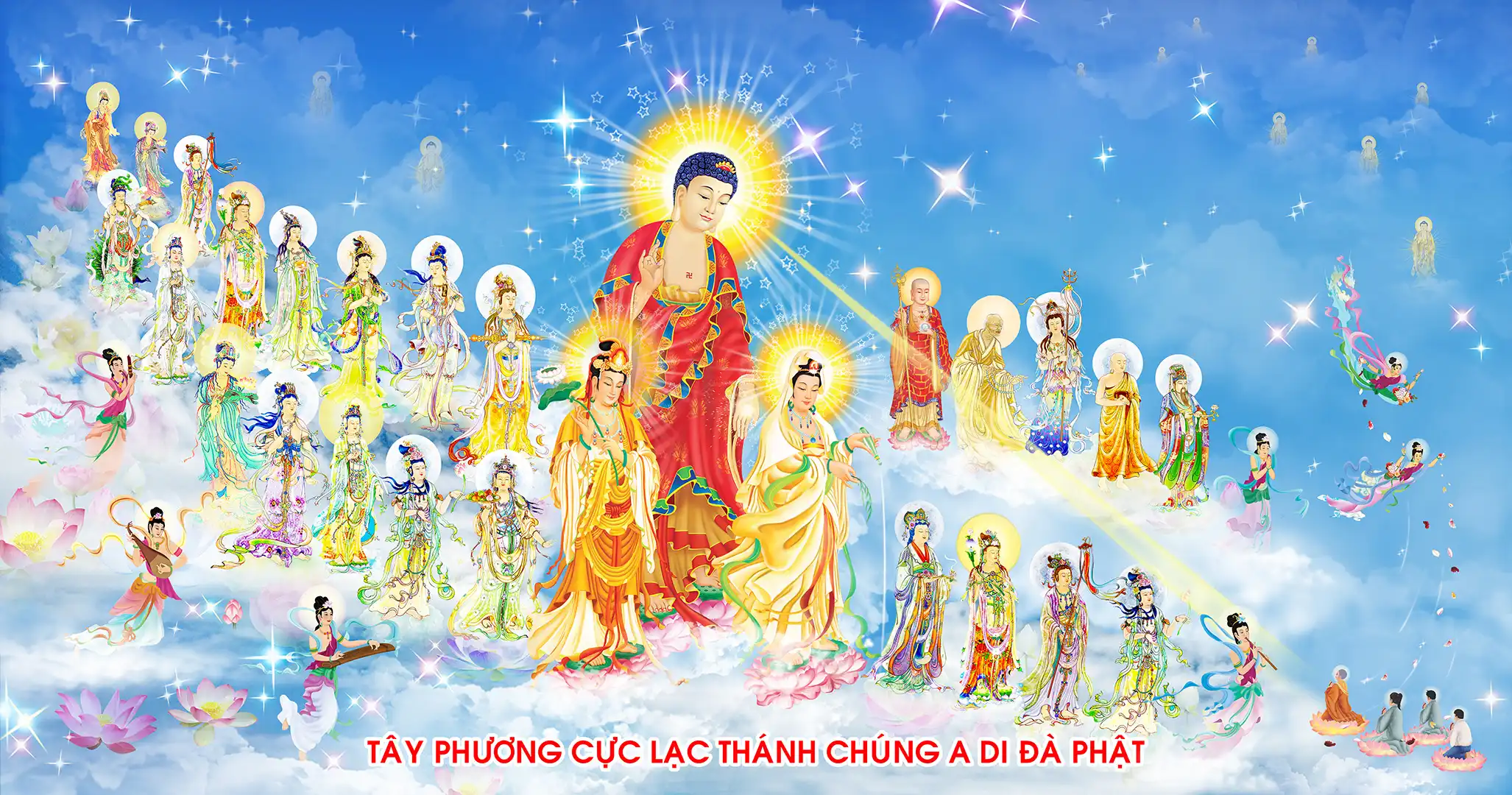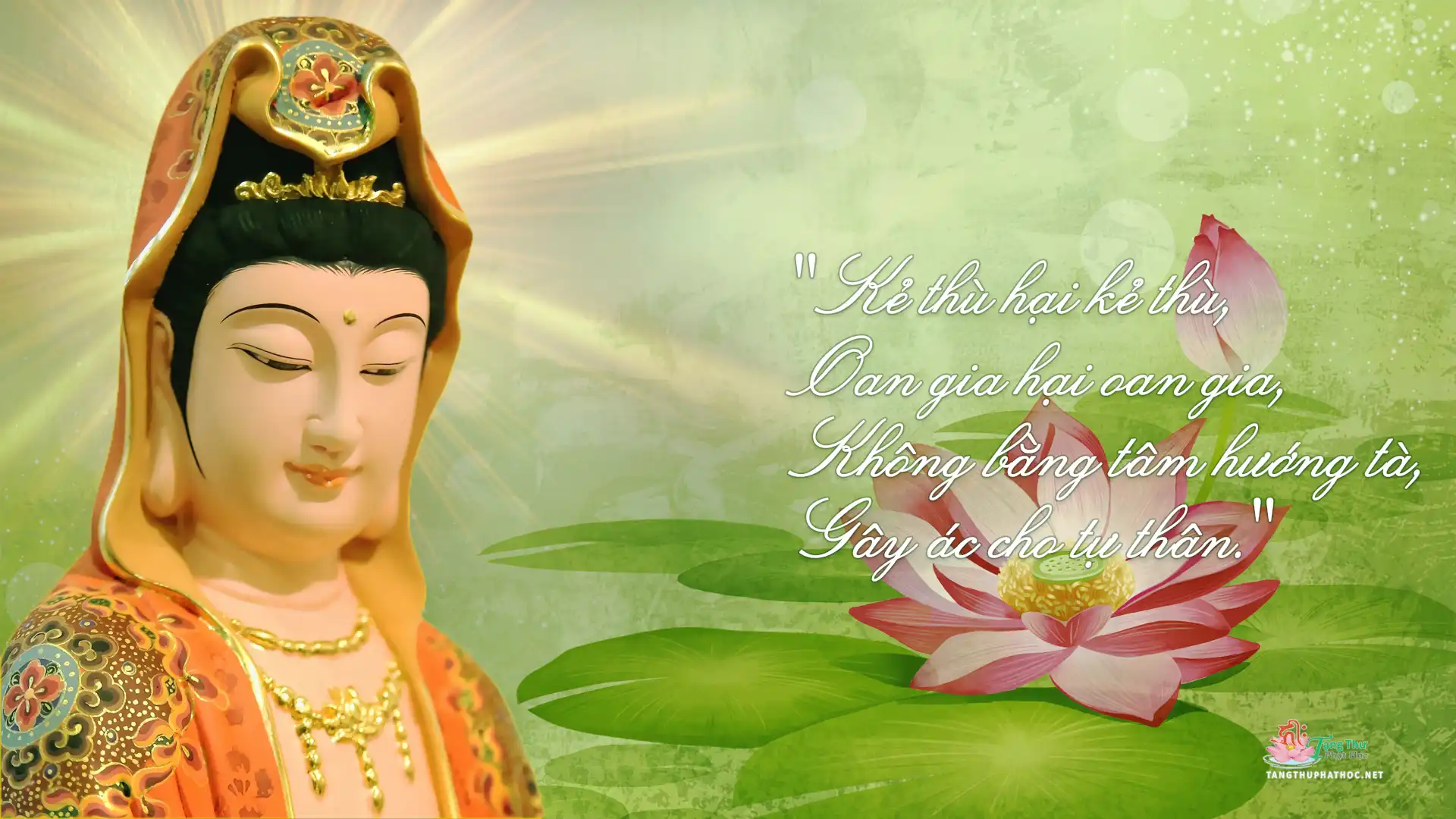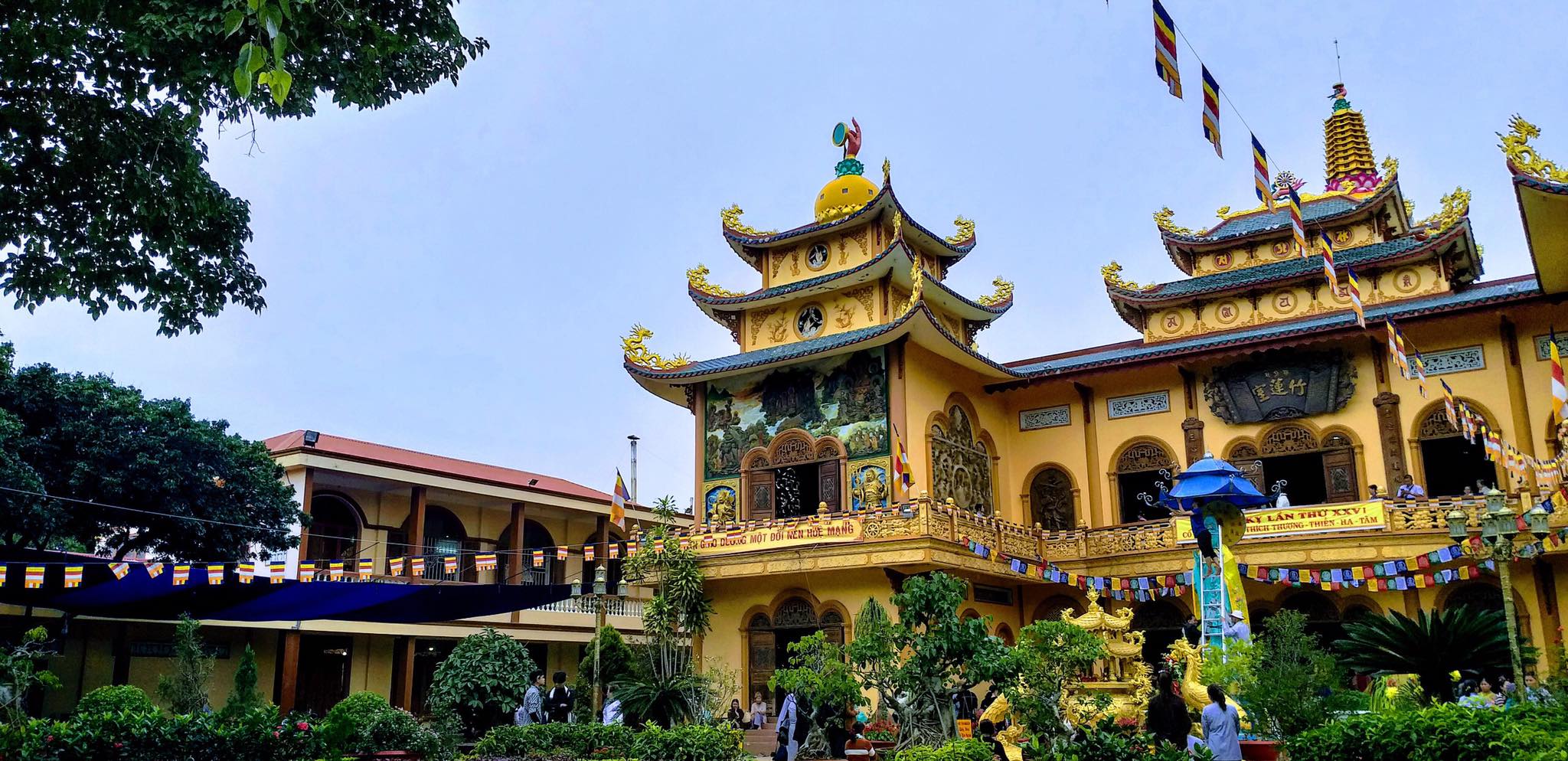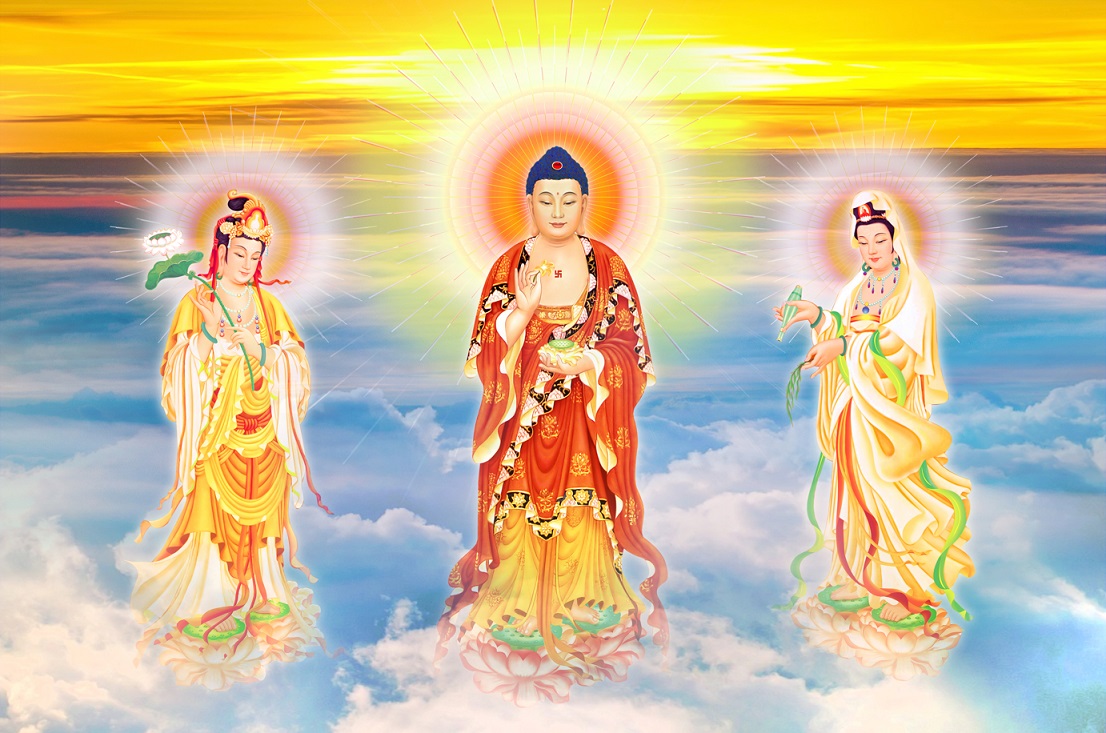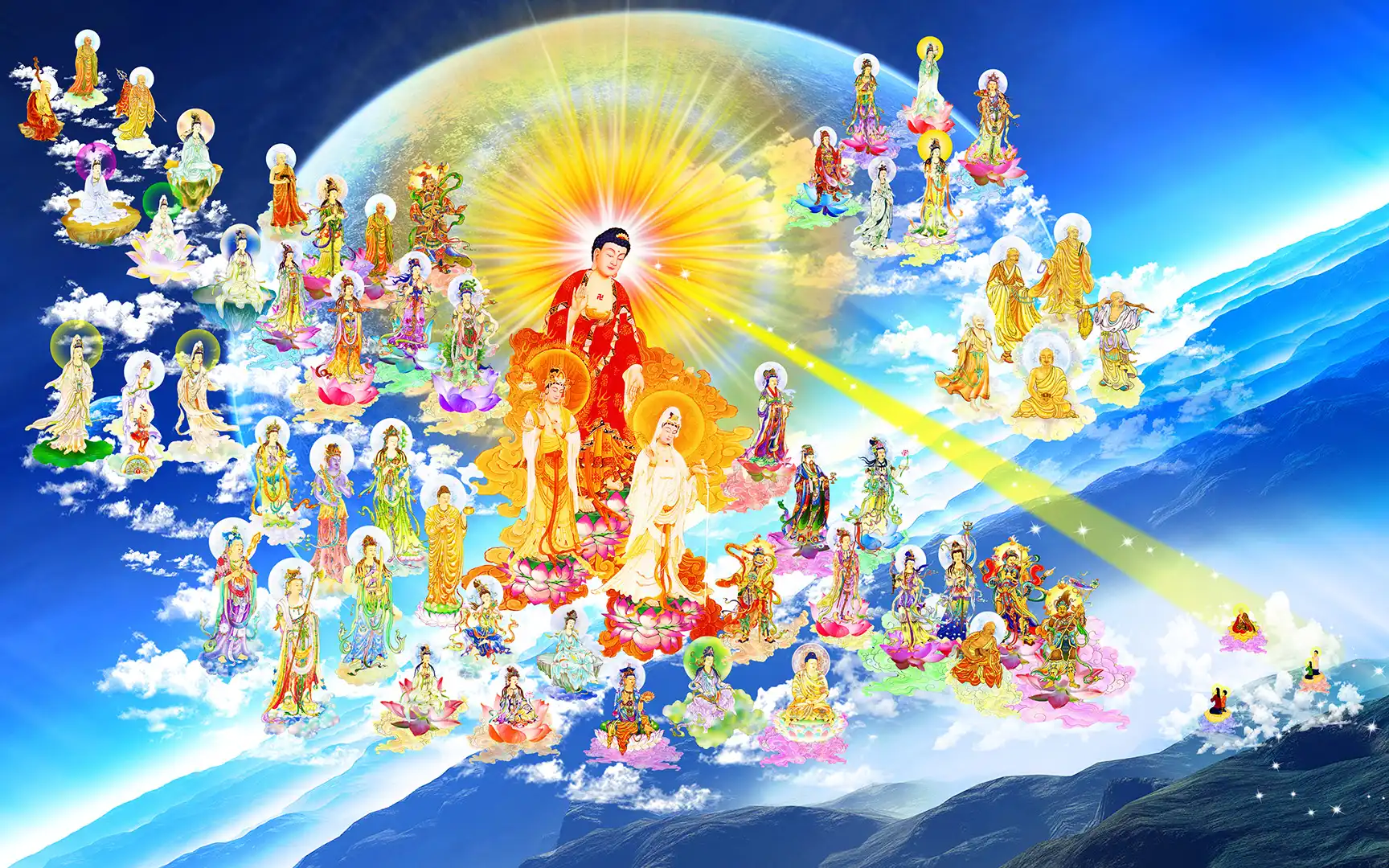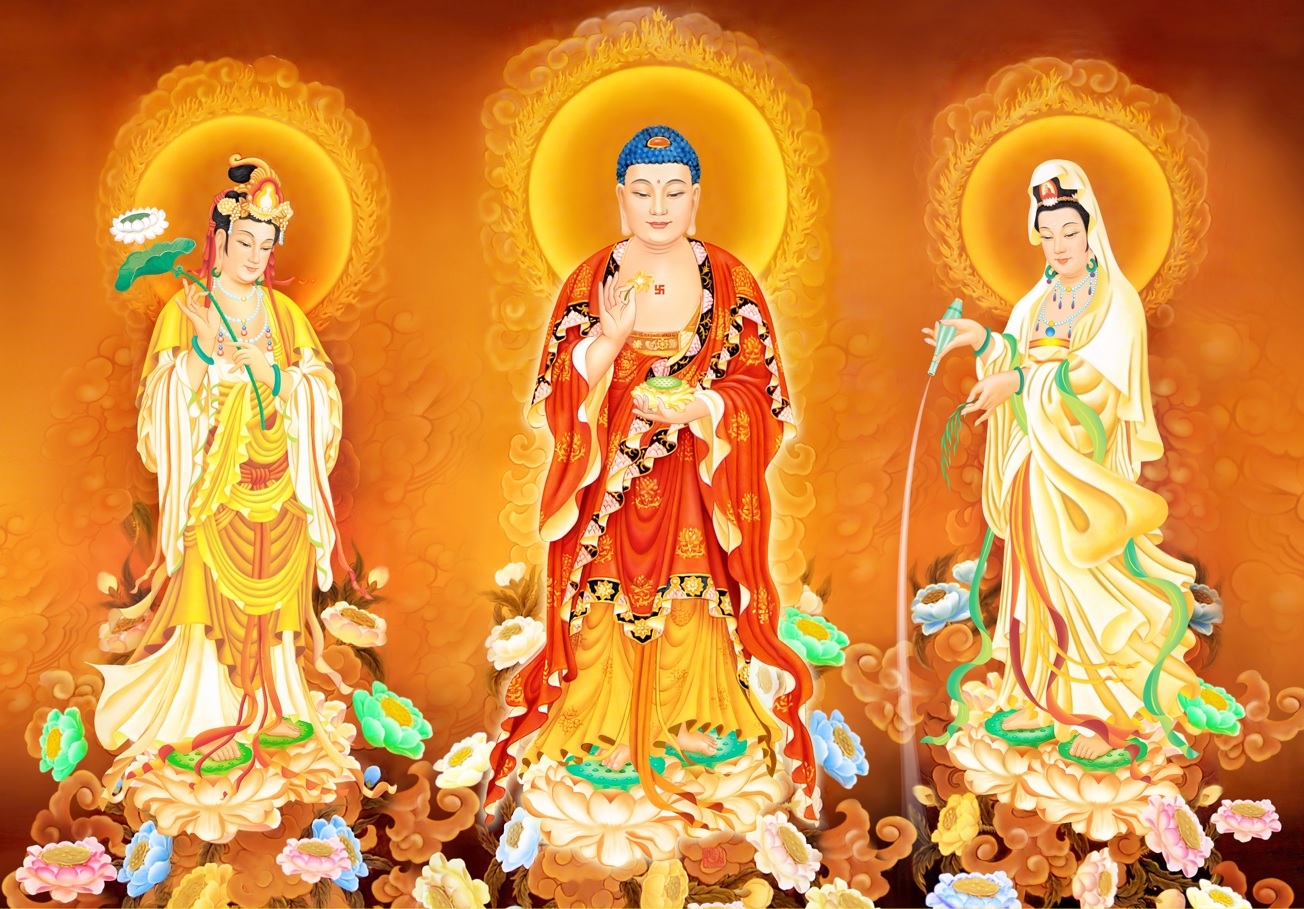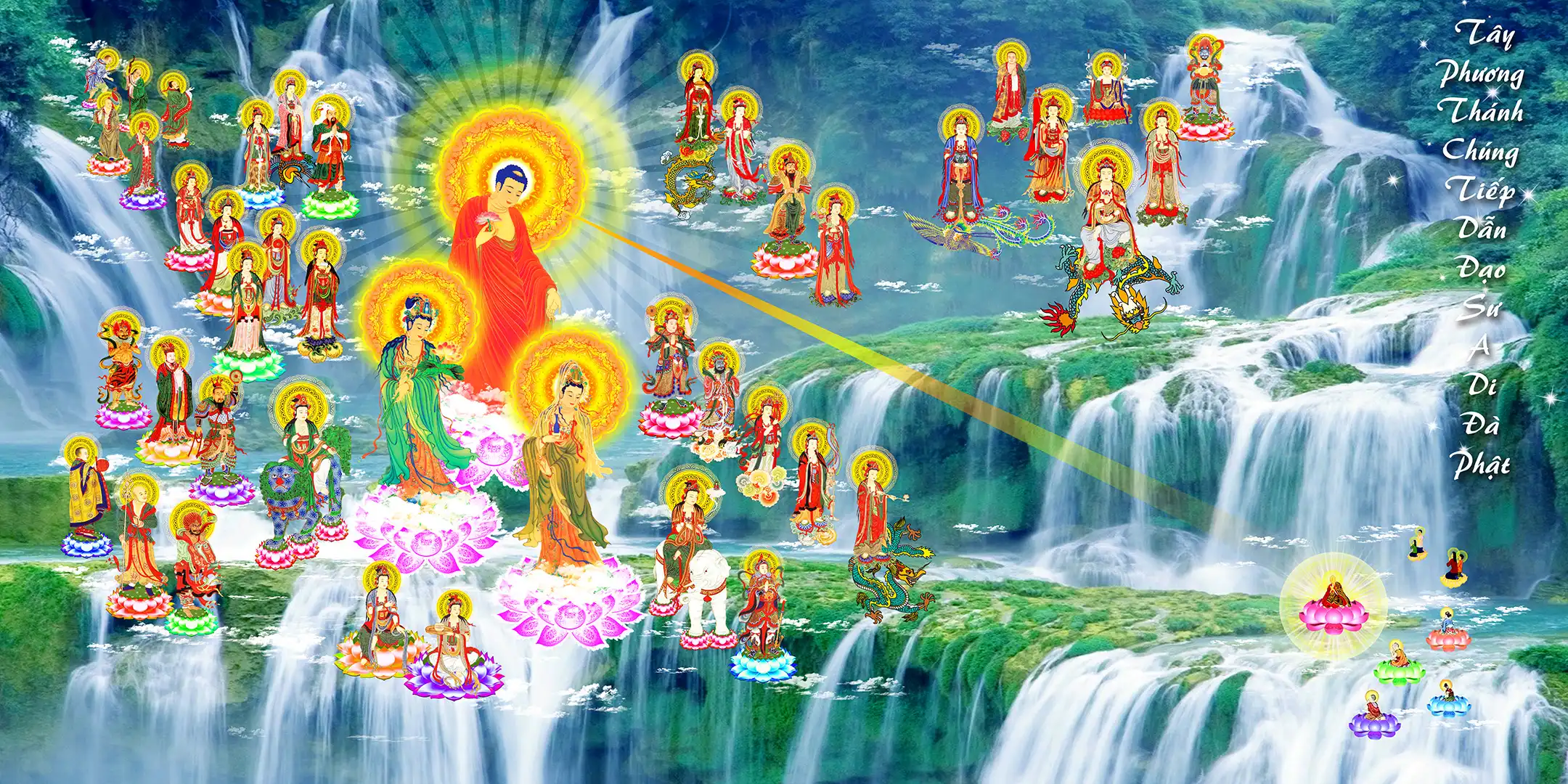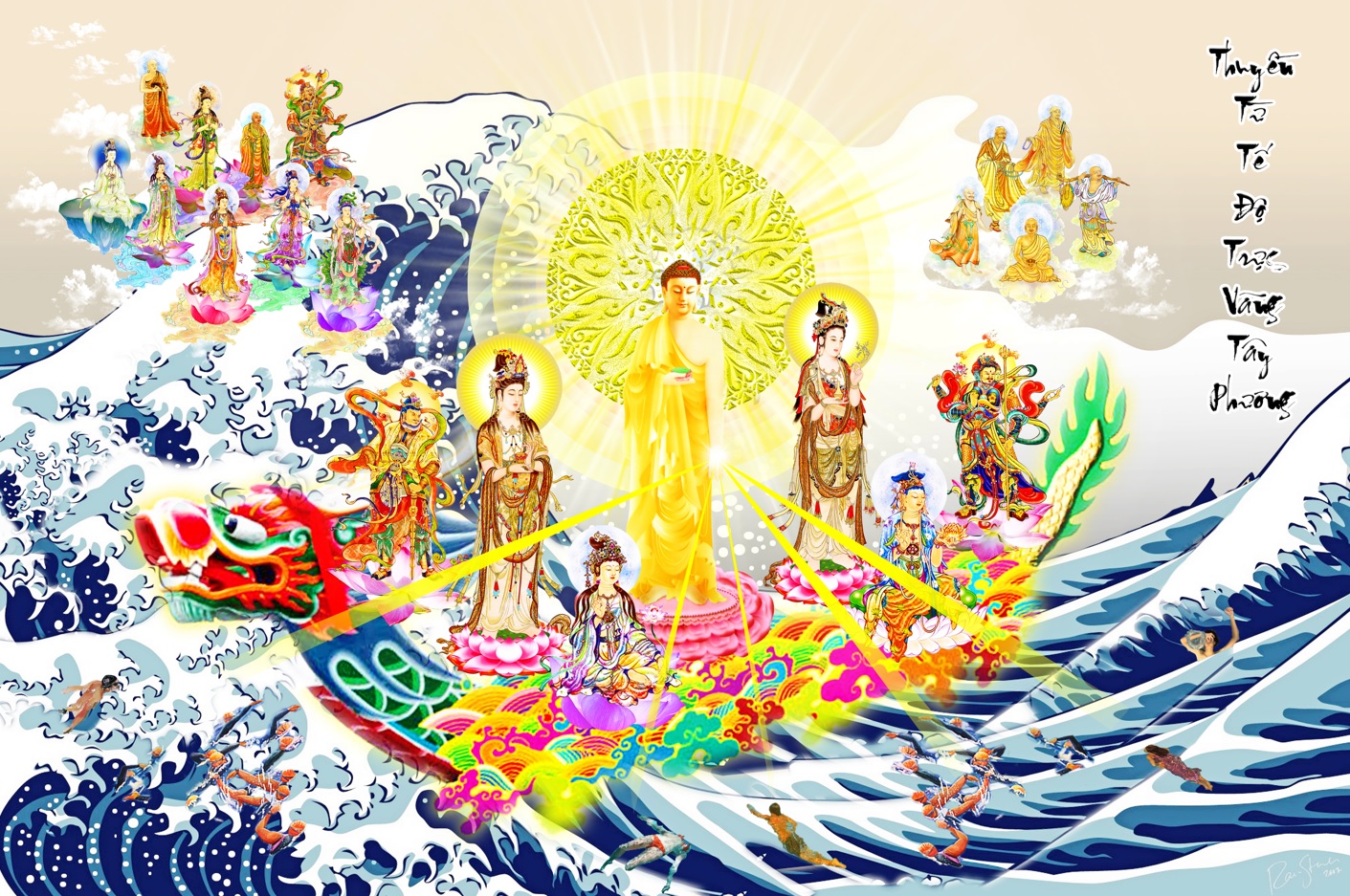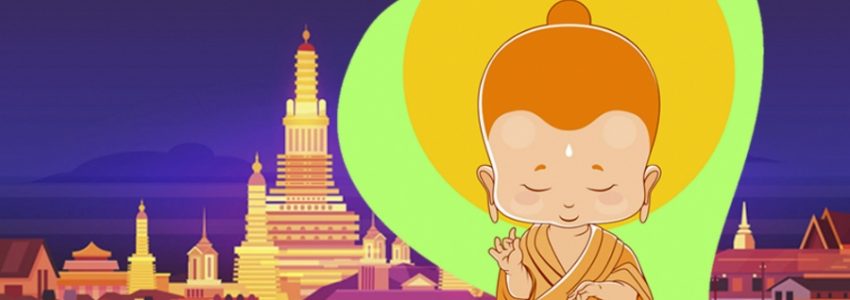THE SORROWLESS FLOWERS
Thiện Phúc
VOLUME I
131. Love and Desires
132. Five Precepts
133. Not to Take Life
134. Not to Steal
135. Not to Commit Sexual Misconduct
136. Not to Lie
137. Not to Drink Alcohol and Other Intoxicants
138. Breaking Precepts
139. Five Grave Sins
140. Ailments
131. Love and Desires
There are many different meanings of “Love”. Love as craving or sexual desire is one of the major causes of sufferings and rebirth. According to Buddhism, love is understanding, love does not judge or condemn, love listens and understands, love cares and sympahizes, love accepts and forgives, and so on and and so on. Thus, in Buddhism, love has the meaning of “selfless love” which accompanies with loving-kindness, compassion, joy, and equanimity. Love goes hand-in-hand with compassion. When we have a loving heart, compassion arises easily in us. Whenever we see somebody suffering, we feel an urge to reach out to help the person ease his or her suffering. To remove or ease another’s suffering is the main characteristic of love. Thus, those who is compassionate, loving and forgiving, they really understand the meanings of the word “Love” in Buddhism. In fact, emancipation in Buddhism is not unrealistic, if we know how to focus from “Selfish” to “Altruistic”, and think more about others’ well-being and welfare, we have already liberated ourselves. There are two kinds of love: passion love and religious love. Ordinary human love springing from desire, in contrast with religious love (Pháp ái). Love inspired by desire through any of the five senses. Ordinary human love springing from desire, in contrast with religious love (Pháp ái). Love inspired by desire through any of the five senses. Bodhisattva or religious love springing from the vow to save all creatures. Bodhisattva love with desire to save all creatures, in contrast with ordinary love.
Love and desire means loves that attach to desires or love of family. Love and desire are the stumbling blocks in cultivation. Besides, the sea of emotional love of birth and death is fundamental obstacle to the Way. If cultivators feel love and desire, whether for people or objects, it will hinder them from making progress in cultivation. In one word, love and desire are just birth and death, and birth and death are just love and desire. Thus love and desire are the root of birth and death. If we don’t break through the ignorance of love and desire, there is no way we can escape the cycle of birth and death. Sincere Buddhists should always remember that before thinking of the Buddhahood, we should first cut off desire and get rid of love. More than twenty-five hundred years ago, Prince Siddhartha Gautama did just that before he became a wandering ascetic monk. Sincere Buddhists should always remember that we all are human beings, and human beings surely have emotions, but we Buddhists should not cling to such emotions of love and desire. We should treat everyone equally, showing loving-kindness and compassion to all, but we must be careful not to get trapped in the trap of love and desire. Buddhists have no other way to transcend but cutting off desire and getting rid of love, for whatever we are fond of, we love, and whatever we dislike, we hate. So if we don’t cut desire and get rid of love, we will continue to go round and round in the cycle of love and hate forever.
In the Dharmapada Sutra, the Buddha taught: “It is difficult to renounce the world. It is difficult to be a householder. It is painful to associate with those who are not friends. It is painful to be wandering in the samsara forever. Reaching the enlightenment and let wander no more! Let’s suffer no more! (Dharmapada 302). Whoever binds to craving, his sorrows flourish like well-watered birana grass (Dharmapada 335). Whoever in this world overcomes this unruly craving, his sorrows fall away just like water-drops from a lotus leaf (Dharmapada 336). This is my advice to you: “Root out craving; root it out, just like birana grass is rooted out. Let not Mara crush you again and again as a flood crushes a reed! (Dharmapada 337). Latent craving is not conquered, suffering recovers and grows again and again, just like a tree hewn down grows up again as long as its roots is unrooted (Dharmapada 338). If in any man, the thirty-six streams of craving are still flowing, such deluded person is still looking for pleasure and passion, and torrential thoughts of lust sweep him away (Dharmapada 339). Streams of pleasure and passion flow in all directions, just like the creeper sprouts and stands. Seeing the creeper that has sprung up in your mind, cut it off with wisdom (Dharmapada 340). Common people are subject to attachment and thirst; they are always happy with pleasure; they run after passion. They look for happiness, but such men caught in the cycle of birth and decay again and again (Dharmapada 341). Men who are crazed with craving, are terrified like hunted hares. The more they hold fast by fetters, bonds, and afflictions, the longer they suffer (Dharmapada 342). Men who are crazed with craving, are terrified just like hunted hares. Therefore, a monk who wishes his own passionlessness, should first banish craving (Dharmapada 343). He who is free from desire for the household, finds pleasure (of asceticism or monastic life) in the forest, yet run back to that very home. Look at that man! He runs right back into that very bondage again! (Dharmapada 344). To a wise man, the bondage that is made of hemp, wood or iron, is not a strong bond, the longing for wives, children, jewels, and ornaments is a greater and far stronger attachment (Dharmapada 345). The wise people say that that bond is very strong. Such fetters seem supple, but hard to break. Break them! Cut off desire and renounce the world! (Dharmapada 346). A man infatuated with lust falls back into the stream as a spider into the web spun by itself. He who cuts off this bond, retire from the world, with no clinging, will leave all sorrow behind (Dharmapada 347). He who has reached the goal, without fear, without craving and without desire, has cut off the thorns of life. This is his final mortal body (Dharmapada 351). He who is without craving, without attachment; who understands subtleties of words and meanings; they are truly a great wise who bear the final mortal body (Dharmapada 352). Strive hard to cut off the stream of desires. Oh! Brahman! Knowing that all conditioned things will perish. Oh! Brahman! You are a knower of the Unmade Nirvana! (Dharmapada 383).”
132. Five Precepts
Good conduct forms a foundation for further progress on the path of personal development. The morality is also the foundation of all qualities. Besides, morality is the most importatant base that prepare Buddhist cultivators in cultivating the Eightfold Noble Path. According to Buddhism, the way of practice of good conduct includes three parts of the the Eightfold Noble Path, and these three parts are Right Speech, Right Action, and Right Livelihood. The five basic commandments of Buddhism are the five commandments of Buddhism (against murder, theft, lust, lying and drunkenness). The five basic prohibitions binding on all Buddhists, monks and laymen alike; however, these are especially for lay disciples. The observance of these five ensures rebirth in the human realm. When we respect and keep these five precepts, not only we give peace and happiness to ourselves, we also give happiness and peace to our families and society. People will feel very secure and comfortable when they are around us. Besides, to keep the basic five precepts will make us more generous and kind, will cause us to care and share whatever we can share with other people. Observing of the five precepts will help us with the followings: help make our life have more quality, help us obtain dignity and respect from others, help make us a good member of the family, a good father or mother, a filial child, help make us good citizens of the society.
133. Not to Take Life
Not to take life is the first in the Five Precepts. We are living in an imperfect world where the strong prey on the weak, big animals prey on small animals, and killing is spreading everywhere. Even in the animal world, we can see a tiger would feed on a deer, a snake on a frog, a frog on other small insects, or a big fish on a small fish, and so on. Let us take a look at the human world, we kill animals, and sometimes we kill one another for power. Thus, the Buddha set the first rule for his disciples, “not to kill.” Not to kill the living, the first of the ten commandments. Not to kill will help us become kind and full of pity. This is the first Buddhist precept, binding upon clergy and laity, not to kill and this includes not to kill, not to ask other people to kill, not to be joyful seeing killing, not to think of killing at any time, not to kill oneself (commit suicide), not to praise killing or death by saying “it’s better death for someone than life.” Not to kill is also including not to slaughtering animals for food because by doing this, you do not only cut short the lives of other beings, but you also cause pain and suffering for them.
“Not to Take Life” is one of the first eight of the ten commandments which the Buddha set forth for lay Buddhists to observe 24 hours every fornight. If we truly believe that all sentient beings are the Buddhas of the future, we would never think of killing or harming them in any way. Rather, we would have feelings of loving-kindness and compassion toward all of them, without exception. Buddhists do not take life out of the pity of others. Besides, not to kill will help us become kind and full of pity. Devout Buddhists should always remember the Buddha’s teachings, not only not to kill, not only do we respect life, we also cherish it. Abstain from killing and to extend compassion to all beings does not entail any restriction. All beings, in Buddhism, implies all living creatures, all that breathe. It is an admitted fact that all that live, human or animal, love life and hate death. As life is precious to all, their one aim is to preserve it from harm and prolong it. This implies even to the smallest creatures that are conscious of being alive. According to the Dhammapada (131), “Whoever in his search for happiness harasses those who are fond of happiness will not be happy in the hereafter.” The happiness of all creatures depends on their being alive. So to deprive them of that which contains all good for them, is cruel and heartless in the extreme. Thus, not to harm and kill others is one of the most important virtue of a Buddhist. Those who develop the habit of being cruel to animal are quite capable of ill treating people as well when the opportunity comes. When a cruel thought gradually develops into an obsession it may well lead to sadism. Those who kill suffer often in this life. After this life, the karma of their ruthless deeds will for long force them into states of woe. On the contrary, those who show pity towards others and refrain from killing will be born in good states of existence, and if reborn as humans, will be endowed with health, beauty, riches, influences, and intelligence, and so forth.
Not to kill or injure any living being, or refraining from taking life. This is the first of the five commandments. Pranatipata-viratih also means not to have any intention to kill any living being; this includes animals, for they feel pain just as human do. On the contrary, one must lay respect and save lives of all sentient beings. The Buddha always taught in his sutras: “The greatest sin is killing; the highest merit is to save sentient lives. Life is dear to all.” In fact, all beings fear death and value life, we should therefore respect life and not kill anything. This precept forbids not only killing people but also any creature, especially if it is for money or sport. We should have an attitude of loving-kindness towards all beings, wishing them to be always happy and free. Caring for the Earth, not polluting its rivers and air, not destroying its forests, etc, are also included in this precept.
Killing is one of the four grave prohibitions or sins in Buddhism. Killing is intentionally taking the life of any being, including animals. The advice of not killing challenges us to think creatively of alternate means to resolve conflict besides violence. Refraining from taking life. This is the first of the five commandments. Pranatipata-viratih also means not to have any intention to kill any living being; this includes animals, for they feel pain just as human do. On the contrary, one must lay respect and save lives of all sentient beings. The Buddha always taught in his sutras: “The greatest sin is killing; the highest merit is to save sentient lives.” According to the Buddhist laws, the taking of human life offends against the major commands, of animal life against the less stringent commands. Suicide also leads to severe penalties in the next lives. According to Most Venerable Dhammananda in the Gems of Buddhism Wisdom, the prohibition against the taking of any life applies not only to humanity but also to creatures of every kind, both big and small; black ants as well as red ants. Each day a vast number of animals are slaughtered as food, for most people eat meat, while vegeterians are not common. In the field of science, animals are used in many researches and experiments. In the administrative field, arms are used in crime suppression. Law enforcement agencies punish law breakers. Belligerents at war use arms to destroy one another. The actions cited here as examples are not regarded as illegal or as running counter to normal worldly practice. Indeed, it may even be considered wrong to abstain from them, as is the case when constables or soldiers fail in their police or military duties. Nowadays many kinds of animals are known to be carriers of microbes and, thanks to the microscope, germs and many sorts of microbes have been detected. Almost everything contains them, even drinking water. Only the larger impurities are caught by filter; microbes can pass through. So infinite microbes pass into our throats with each draught of water. It is the same medicines. Whenever they are used, either externally or internally, they destroy myriads of microbes. Are these microbes to be considered as living beings in the sense of the first sila or are they not? If so, perhaps no one can fully comply with it. Besides, some are of the opinion that people who refrain from taking the life of animals should also refrain from eating meat, because it amounts to encouraging slaughter and is no less sinful according to them.
Killing is one of the ten kinds of evil karma, to kill living beings, to take life, kill the living, or any conscious being. According to The Buddha and His Teaching, written by Most Venerable Narada, killing means the intentional destruction of any living being. The Pali term pana strictly means the psycho-physical life pertaining to one’s particular existence. The wanton destruction of this life-force, without allowing it to run its due course, is panatipata. Pana also means that which breathes. Hence all animate beings, including animals, are regarded as pana. However, plants are not considered as “living beings” as they possess no mind. Monks and nuns, however, are forbidden to destroy even plant life. This rule, it may be mentioned, does not apply to lay-followers. Five conditions that are necessary to complete the evil of killing: a living being, knowledge that it is a living being, intention of killing, effort to kill, and consequent death (cause the death of that being). The gravity of the evil deed of killing depends on the goodness and the magnitude of the being concerned.If the killing of a virtuous person or a big animal is regarded as more heinous than the killing of a vicious person or a small animal, because a greater effort is needed to commit the evil and the loss involved is considerably great. The evil effetcs of killing include brevity of life, ill-health, constant grief due to the separation from the loved one, and constant fear.
Devout Buddhists should not kill, but should always save and set free living beings. Liberating living beings means not to kill but to save and set free living beings. A person with a greatly compassionate heart never kills living beings. On the contrary, that person always tries the practice of liberating living beings. A sincere Buddhist should always maintain a mind of kindness and cultivate the practice of liberating liberating beings. The Buddha taught: “A sincere Buddhist should always reflect thus ‘All male beings have been my father and all females have been my mother. There is not a single being who has not given birth to me during my previous lives, hence all beings of the Six Paths are my parents. Therefore, when a person kills and eats any of these beings, he thereby slaughters my parents.” According to Buddhist theory, the only reason that causes wars in the world is people’s collective killing karma is so heavy. If in this life, I kill you, in the next life, you’ll kill me, and in the life after that, I will come back to kill you. This cycle of killing continues forever. People kill animals and in their next life they may become animals. The animals which they once killed now may return as people to claim revenge. This goes on and on. That’s why there exists an endless cycle of killing and bloodshed. To decrease or diminish our killing karma, we must practice liberating living beings. The merit and virtue that we accumulate from liberating animals is boundless. It enables us to cause living beings to live their full extent of their natural life span. The more we engage in liberating living beings, the lighter the collective killing karma our world has.
If living beings in the six paths of any mundane world had no thoughts of killing, they would not have to follow a continual succession of births and deaths. According to the Surangama Sutra, the Buddha reminded Ananda about “cutting off killing”, one of the four important precepts for monks and nuns in Buddhism: “Ananda! If living beings in the six paths of any mundane world had no thoughts of killing, they would not have to follow a continual succession of births and deaths. Ananda! Your basic purpose in cultivating samadhi is to transcend the wearisome defilements. But if you do not remove your thoughts of killing, you will not be able to get out of the dust. Ananda! Even though one may have some wisdom and the manifestation of Zen Samadhi, one is certain to enter the path of spirits if one does not cease killing. At best, a person will become a mighty ghost; on the average, one will become a flying yaksha, a ghost leader, or the like; at the lowest level, one will become an earth-bound rakshasa. These ghosts and spirits have their groups of disciples. Each says of himself that he has accomplished the unsurpassed way. After my extinction, in the Dharma-Ending Age, these hordes of ghosts and spirits will aboud, spreading like wildfire as they argue that eating meat will bring one to the Bodhi Way. Ananda! I permit the Bhikshus to eat five kinds of pure meat. This meat is actually a transformation brought into being by my spiritual powers. It basically has no life-force. You Brahmans live in a climate so hot and humid, and on such sandy and rocky land, that vegetables will not grow. Therefore, I have had to assist you with spiritual powers and compassion. Because of the magnitude of this kindness and compassion, what you eat that tastes like meat is merely said to be meat; in fact, however, it is not. After my extinction, how can those who eat the flesh of living beings be called the disciples of Sakya? You should know that these people who eat meat may gain some awareness and may seem to be in samadhi, but they are all great rakshasas. When their retribution ends, they are bound to sink into the bitter sea of birth and death. They are not disciples of the Buddha. Such people as they kill and eat one another in a never-ending cycle. How can such people transcend the triple realm? Ananda! When you teach people in the world to cultivate samadhi, they must also cut off killing. This is the second clear and unalterable instruction on purity given by the Thus Come Ones and the Buddhas of the past, World Honored Ones. Therefore, Ananda, if cultivators of Zen Samadhi do not cut off killing, they are like one who stops up his ears and calls out in a loud voice, expecting no one to hear him. It is to wish to hide what is completely evident. Bhikshus and Bodhisattvas who practice purity will not even step on grass in the pathway; even less will they pull it up with their hand. How can one with great compassion pick up the flesh and blood of living beings and proceed to eat his fill? Bhikshus who do not wear silk, leather boots, furs, or down from this country or consume milk, cream, or butter can truly transcend this world. When they have paid back their past debts, they will not have to re-enter the triple realm. Why? It is because when one wears something taken from a living creature, one creates conditions with it, just as when people eat the hundred grains, their feet cannot leave the earth. Both physically and mentally one must avoid the bodies and the by-products of living beings, by neither wearing them nor eating them. I say that such people have true liberation. What I have said here is the Buddha’s teaching. Any explanation counter to it is the teaching of Papiyan.
In the Middle Length Discourses, the Buddha advises people, especially Buddhist followers not to kill because all sentient beings tremble at the stick, to all life is dear. The Buddha has respected for life, any life, even the life of an insect or of a plant. He sets himself an example, not to throw remaining food on green vegetation, or in the water where there are small insects. He advises His disciples not to kill living beings and makes it very clear that, killing living beings will lead to hell, to the hungry ghost or to the animal, and the lightest evil result to be obtained is to be reborn as human being but with very short life. Moreover, killing living beings will bring up fear and hatred in the present and in the future, and pain and suffering in mind. He taught: “O householder, killing living beings, due to killing living beings, fear and hatred arise in the present, fear and hatred will arise in the future, thereby bringing up pain and suffering in mind. Refrain from killing living beings, fear and hatred do not arise in the present, will not arise in the future, thereby not bringing up pain and suffering in mind. Those who refrain from killing living beings will calm down this fear and hatred.” The Buddha taught Bhiksus as follows: “Here, o Bhiksus, the Aryan disciple does not kill living beings, give up killing. O Bhiksus, the Aryan disciple who gives up killing, gives no fear to innumerable living beings, gives no hatred to innumarable living beings, gives harmlessness to innumerable living beings. Having given no fear, no hatred, and harmlessness to innumerable living beings, the Aryan disciple has his share in innumerable fearlessness, in no hatred and in harmlessness. O Bhiksus, this is first class charity, great charity, timeless charity that is not despised by reclusees and brahmanas.” In the Dharmapada Sutra, the Buddha taught: “All tremble at sword and rod, all fear death; comparing others with onerself, one should neither kill nor cause to kill (Dharmapada 129). All tremble at sword and rod, all love life; comparing others with oneself; one should not kill nor cause to kill (Dharmapada 130). He who takes the rod and harms a harmless person, will soon come to one of these ten stages (Dharmapada 137). He will be subject to cruel suffering of infirmity, bodily injury, or serious sickness (Dharmapada 138). Or loss of mind, or oppression by the king, or heavy accusation, or loss of family members or relatives (Dharmapada (139). Or destruction of wealth, or lightening fire fire burn his house, and after death will go to the hell (Dharmapada 140).”
134. Not to Steal
Not to steal or not to cheat, or not to take anything with dishonest intent. Abstain from stealing and to live honestly, taking only what is one’s own by right. To take what belongs to another is not so serious as to deprive him of his life, but it is still a grave crime because it deprives him of some happiness. As no one wants to be robbed, it is not difficult to understand that it is wrong to take what is not one’s own. The thought that urges a person to steal can never be good or wholesome. Then robbery leads to violence and even to murder. This precept is easily violated by those in trade and commerce. A man can use both his pen and his tongue with intent to steal. There can be no peace or happiness in a society where people are always on the look-out to cheat and rob their neighbors. Theft may take many forms. For instance, if an employee slacks or works badly and yet is paid in full, he is really a theft, for he takes the money he has not earned. And the same applies to the employer if he fails to pay adequate wages.
We all have the same right to own things and give them away as we wish. However, we should not take things that do not belong to us by stealing or cheating. Instead, we should learn to give to help others, and always take good care of the things that we use, whether they belong to us or to the public. In a broader sense, this precept means being responsible. If we are lazy and neglect our studies or work, we are said to be “stealing time” of our own. This precept also encourages us to be generous. Buddhists give to the poor and the sick and make offerings to monks and nuns to practice being good. Buddhists are usually generous to their parents, teachers and friends to show gratitude for their advice, guidance and kindness. Buddhists also offer sympathy and encouragement to those who feel hurt or discouraged. Helping people by telling them about the Dharma is considered to be the highest form of giving.
Not to steal because we have no right to take what is not give. Not to steal will help us become honest. Not to steal is one of the first eight of the ten commandments which the Buddha set forth for lay Buddhists to observe 24 hours every fornight. Not to take anything which does not belong to you or what is not given to you. Refraining from taking what is not given. Adattadana-viratih means not directly or indirectly taking other’s belongings. On the contrary, one should give things, not only to human beings, but also to animals. The Buddha always taught in his sutras “desire brings great misfortune; giving brings great fortune.” Not to steal because we have no right to take what is not given. Not to steal will help us becom honest. Five conditions are necessary for the completion of the evil of stealing: another’s property, knowledge that it is so, intention of stealing, effort to steal, and actual removal. Devout Buddhists should not steal, for not stealing will help us increase our generosity, increase trust in other people, increase our honesty, life without sufferings, and life without disappointment.
According to the Surangama Sutra, the Buddha reminded Ananda about “cutting off stealing”, one of the four important precepts for monks and nuns in Buddhism: “Ananda! If living beings in the six paths of any mundane world had no thoughts of stealing, they would not have to follow a continuous succession of births and deaths. Ananda! Your basic purpose in cultivating samadhi is to transcend the wearisome defilements. But if you do not renounce your thoughts of stealing, you will not be able to get out of the dust. Ananda! Even though one may have some wisdom and the manifestation of Zen Samadhi, one is certain to enter a devious path if one does not cease stealing. At best, one will be an apparition; on the average, one will become a phantom; at the lowes level, one will be a devious person who is possessed by a Mei-Ghost. These devious hordes have their groups of disciples. Each says of himself that he has accomplished the unsurpassed way. After my extinction, in the Dharma-Ending Age, these phantoms and apparitions will abound, spreading like wildfire as they surreptitiously cheat others. Calling themselves good knowing advisors, they will each say that they have attained the superhuman dharmas. Enticing and deceiving the ignorant, or frightening them out of their wits, they disrupt and lay watse to households wherever they go. I teach the Bhikshus to beg for their food in an assigned place, in order to help them renounce greed and accomplish the Bodhi Way. The Bhikshus do not prepare their own food, so that, at the end of this life of transitory existence in the triple realm, they can show themselves to be once-returners who go and do not come back. How can thieves who put on my robes and sell the Thus Come One’s dharmas, saying that all manner of karma one creates is just the Buddhadharma? They slander those who have left the home-life and regard Bhikshus who have taken complete precepts as belonging to the path of the small vehicle. Because of such doubts and misjudgments, limitless living beings fall into the Unintermittent Hell. I say that Bhikshus who after my extinction have decisive resolve to cultivate samadhi, and who before the images of Thus Come Ones can burn a candle on their bodies, or burn off a finger, or burn even one incense stick on their bodies, will in that moment, repay their debts from beginningless time past. They can depart from the world and forever be free of outflows. Though they may not have instantly understood the unsurpassed enlightenment, they will already have firmly set their mind on it. If one does not practice any of these token renunciations of the body on the causal level, then even if one realizes the unconditioned, one will still have to come back as a person to repay one’s past debts exactly as I had to undergo the retribution of having to eat the grain meant for horses. Ananda! When you teach people in the world to cultivate samadhi, they must also cease stealing. This is the third clear and unalterable instruction on purity given by the Thus Come One and the Buddhas of the past, World Honored Ones. Therefore, Ananda, if cultivators of Zen Samadhi do not cease stealing, they are like someone who pours water into a leaking cup and hopes to fill it. He may continue for as many eons as there are fine motes of dust, but it still will not be full in the end. If Bhikshus do not store away anything but their robes and bowls; if they give what is left over from their food-offerings to hungry living beings; if they put their palms together and make obeisance to the entire great assembly; if when people scold them they can treat it as praise: if they can sacrifice their very bodies and minds, giving their flesh, bones, and blood to living creatures. If they do not repeat the non-ultimate teachings of the Thus Come One as though they were their own explanations, misrepresenting them to those who have just begun to study, then the Buddha gives them his seal as having attained true samadhi. What I have said here is the Buddha’s teaching. Any explanation counter to it is the teaching of Papiyan.
135. Not to Commit Sexual Misconduct
Not to engage in improper sexual conduct. Against lust, not to commit adultery, to abstain from all sexual excess, or refraining from sexual misconduct. This includes not having sexual intercourse with another’s husband or wife, or being irresponsible in sexual relationship. Adultery is wrong. Laypeople should be responsible in sexual matters. If we do not have the great opportunity to renounce the world to become monks and nuns to cultivate obtain liberation, we should keep a good relationship between husband and wife, we should be considerate, loving and faithful to each other, then our family will be happy, and our society will be better. One who commits it does not command respect nor does one inspire confidence. Sexual misconduct involving person with whom conjugal relations should be avoided to custom, or those who are prohibited by law, or by the Dharma, is also wrong. So is coercing by physical or even financial means a married or even unmarried person into consenting to such conduct. The purpose of this third sila is to preserve the respectability of the family of each person concerned and to safeguard its sanctity and inviolability.
According to The Path of Purification, “Bad Ways” is a term for doing what ought not to be done and not doing what ought to be done, out of desire, hate, delusion, and fear. They are called “bad ways” because they are ways not to be travel by Noble Ones. Adultery is mentioned in Buddhist texts as one of a number of forms of similar sexual misconduct. For monks or nuns who only think about or wish to commit sexual intercourse with any people (not wait until physically commiting sexual intercourse) are guilty and violate the Vinaya commandments and must be excommunicated from the Order. For laypeople, thinking or wishing to make love or physically making love with those who are not their husband or wife is forbidden. Avoiding the misuse of sex is respect for people and personal relationships. Much unhappiness arises from the misuse of sex and from living in irresponsible ways. Many families have been broken as a result, and many children have been victims of sexual abuse. For all lay Buddhists, the happiness of others is also the happiness of ourselves, so sex should be used in a caring and loving manner, not in a craving of worldly flesh. When observing this precept, sexual desire should be controlled, and husbands and wives should be faithful towards each other. This will help to create peace in the family. In a happy family, the husband and wife respect, trust and love each other. With happy families, the world would be a better place for us to live in. Young Buddhists should keep their minds and bodies pure to develop their goodness.
Devout Buddhists should not commit sexual misconduct (to have unchaste) because first, we don’t want to be a bad person in the society; second, not to have unchaste will help us become pure and good. Not to commit sexual misconduct is the third commandment of the five basic commandments for lay people, and the third precept of the ten major precepts for monks and nuns in the Brahma Net Sutra. Monks or nuns who commit this offence will be expelled from the Order forever. This is one of the first eight of the ten commandments which the Buddha set forth for lay Buddhists to observe 24 hours every fornight. There are four conditions that are necessary to complete the evil of sexual misconduct: the thought to enjoy, consequent effort, means to gratify (gratification or the act of sexual misconduct). For Monks and Nuns, a Bhiksu who, when motivated by sexual desire, tells a woman or a man that it would be a good thing for her or him to have sexual relations with him, commits a Sangha Restoration Offence. A Bhiksuni who is intent upon having sexual relations with someone, whether male or female, breaks one of the eight Degradation Offences. She is no longer worthy to remain a Bhiksuni and cannot participate in the actiivities of the Order of Bhiksunis. Through word or gesture arouses sexual desire in that person, breaks the seventh of the Eight Degradation Offences. Says to that person that she is willing to offer him or her sexual relations, breaks the eighth of the Eight Degradation Offences. According to The Buddha and His Teachings, written by Most Venerable Narada, these are the inevitable consequences of Kamesu-micchacara: having many enemies, union with undesirable wives and husbands (spouses), and birth as a woman or as a eunuch (thái giám).
If living beings in the six paths of any mundane world had no thoughts of lust, they would not have to follow a continual succession of births and deaths. According to the Surangama Sutra, the Buddha reminded Ananda about “cutting off lust”, one of the four important precepts for monks and nuns in Buddhism: “Ananda! Your basic purpose in cultivating is to transcend the wearisome defilements. But if you don’t renounce your lustful thoughts, you will not be able to get out of the dust. Even though one may have some wisdom and the manifestation of Zen Samadhi, one is certain to enter demonic paths if one does not cut off lust. At best, one will be a demon king; on the average, one will be in the retinue of demons; at the lowest level, one will be a female demon. These demons have their groups of disciples. Each says of himself he has accomplished the unsurpassed way. After my extinction, in the Dharma-Ending Age, these hordes of demons will abound, spreading like wildfire as they openly practice greed and lust. Calming to be good knowing advisors, they will cause living beings to fall into the pit of love and views and lose the way to Bodhi Ananda! When you teach people in the world to cultivate samadhi, they must first of all sever the mind of lust. This is the first clear and unalterable instruction on purity given by the Thus Come Ones and the Buddhas of the past, World Honored Ones. Therefore, Ananda, if cultivators of Zen Samadhi do not cut off lust, they will be like someone who cooks sand in the hope of getting rice, after hundreds of thousands of eons, it will still be just hot sand. Why? It wasn’t rice to begin with; it was only sand. Ananda! If you seek the Buddha’s wonderful fruition and still have physical lust, then even if you attain a wonderful awakening, it will be based in lust. With lust at the source, you will revolve in the three paths and not be able to get out. Which road will you take to cultivate and be certified to the Thus Come One’s Nirvana? You must cut off the lust which is intrinsic in both body and mind. Then get rid of even the aspect of cutting it off. At that point you have some hope of attaining the Buddha’s Bodhi. What I have said here is the Buddha’s teaching. Any explanation counter to it is the teaching of Papiyan. According to the Anguttara Nikaya, the Buddha taught: “Monk, I know not of any other single form by which a man’s heart is attracted as it is by that of a woman. Monks, a woman’s form fills a man’s mind. Monks, I know not of any other single sound by which a man’s heart is attracted as it is by that of a woman. Monks, a woman’s sound fills a man’s mind. (the same thing happens with smell, flavor, touch…” Sex is described by the Buddha as the strongest impulse in man, If one becomes a slave to this impulse, even the most powerful man turn into a weakling; even the sage may fall from the higher to a lower level. In the Dharmapada Sutra, the Buddha taught: “Four misfortunes occur to a careless man who commits adultery: acquisition of demerit, restlessness, moral blame and downward path (Dharmapada 309). There is acquisition of demerit as well as evil destiny. No joy of the frightened man. The king imposes a heavy punishment. Therefore, man should never commit adultery (Dharmapada 310).” In the Forty-Two Sections Sutra, the Buddha said: “There was once someone who, plagued by ceaseless sexual desire, wished to castrate himself. To cut off your sexual organs would not be as good as to cut off your mind. You mind is like a supervisor; if the supervisor stops, his employees will also quit. If the deviant mind is not stopped, what good does it do to cut off the organs?” The Kasyapa Buddha taught: ‘Desire is born from your will; your will is born from thought. When both aspects of the mind are still, there is neither form nor activity.”
136. Not to Lie
False speech means nonsense or transgression speaking, or lying, either slander, false boasting, or deception. Lying also means not to tell the truth. Lying also means tale-bearing speech, or double tongue speech, or slandering speech. Lying also means harsh speech or frivolous talk. Slander the Buddhist Sutras is considered a serious lying. Slandering the Buddhist sutras means ridiculing Buddhist theories taught by the Buddha and written in the sutras, i.e., saying that the principles in the Buddhist sutras are false, that the Buddhist and Great Vehicle sutras were spoken by demon kings, and so on. This sort of offense cannot be pardoned through repentance. According to The Buddha and His Teachings, there are four conditions that are necessary to complete the evil of lying: an untruth, deceiving intention, utterance, and actual deception. According to Buddhism, “Lying” is the main rationalization for other offenses. Devout Buddhists should always be aware of the following situations: we tell lies when we contend; we tell lies when we are greedy; we tell lies when we seek gratification; we tell lies as we are selfish; we tell lies as we chase personal advantages. We tell lies to deceives people. We commit mistakes but do not want to admit, so we tell lies and try to rationalize for ourselves, and so on, and so on. Also according to The Buddha and His Teachings, written by Most Venerable Narada, there are some inevitable consequences of lying as follow: being subject to abusive speech, vilification, untrustworthiness, and stinking mouth.
The Buddha wanted His disciples to be so perfectly truthful that He encouraged us not to lie, but to speak the truth, the whole truth. Against lying, deceiving and slandering. Not to lie includes not saying bad things, not gossiping, not twisting stories, and not lying. On the contrary, one must use the right gentle speech, which gives benefit to oneself and others. However, sometimes they are unable to speak the truth; for instance, they may have to lie to save themselves from harm, and doctors lie to bolster their patients’ morale. Lying under these circumstances may be contrary to the sila, but it is not entirely contrary to the loving-kindness and to its purpose. This sila aims at bringing about mutual benefits by adhering to truth and avoiding verbal offences. Similarly, utterances harmful to another’s well-being, for example, malicious, abusive or slanderous speech intended either to deride others or to vaunt oneself may be truthful, yet they must be regarded as wrong, because they are contrary to the sila. Sincere Buddhists should always respect each other and not tell lies or boast about ourselves. This would result in fewer quarrels and misunderstandings, and the world would be a more peaceful place. In observing the fourth precept, we should always speak the truth.
There are four ways of “Mrsavadaviratih”. The first way is “lying”. Lying means verbally saying or indicating through a nod or a shrug somethng we know isn’t true. However, telling the truth should be tempered and compassion. For instance, it isn’t wise to tell the truth to a murderer about a potential victim’s whereabouts, if this would cause the latter’s death. We should not to lie because if we lie, nobody would believe us. Furthermore, not to lie will help us become truthful and trustful. According to the Dharmapada Sutra, verse 306, the Buddha taught: “The speaker of untruth goes down; also he who denies what he has done, both sinned against truth. After death they go together to hells.” The second way is “Tale-bearing” or “Slandering”. To slander means to twist stories, or to utilize slandering words. The Pali word means literally ‘breaking up of fellowship’. To slander another is most wicked for it entails making a false statement intended to damage someone’s reputation. The slanderer often commits two crimes simultaneously, he says what is false because his report is untrue and then he back-bites. In Sanskrit poetry the back-biter is compared to a mosquito which though small is noxious. It comes singing, settles on you, draws blood and may give you malaria. Again the tale-bearer’s words may be sweet as honey, but his mind is full of poison. Let us then avoid tale-bearing and slander which destroy friendships. Instead of causing trouble let us speak words that make for peace and reconciliation. Instead of sowing the seed of dissension, let us bring peace and friendship to those living in discord and enmity. The third way is “Harsh speech” (Pharusavaca p). Harsh words include insult, abuse, ridicule, sarcasm, and so on. Sometimes harsh words can be said with a smile, as when we innocently pretend what we have said won’t hurt other people. Devout Buddhists should never use harsh words because harsh words hurt others. According to The Buddha and His Teaching, written by Most Venerable Narada, there are three conditions that are necessary to complete the evil of harsh speech: a person to be abused, an angry thought, and the actual abuse. The inevitable consequences of harsh speech: being detested by others though absolutely harmless, and having a harsh voice. At the time of the Buddha, one day, an angry man with a bad temper went to see the Buddha. The man used harsh words to abuse the Buddha. The Buddha listened to him patiently and quietly, and did not say anything as the man spoke. The angry man finally stopped speaking. Only then did the Buddha ask him, “If someone wants to give you something, but you don’t want to accept it, to whom does the gift belong?” “Of course it belongs to the person who tried to give it away in the first place,” the man answered. “Likewise it is with your abuse,” said the Buddha. “I do not wish to accept it, and so it belongs to you. You should have to keep this gift of harsh words and abuse for yourself. And I am afraid that in the end you will have to suffer it, for a bad man who abuses a good man can only bring suffering on himself. It is as if a man wanted to dirty the sky by spitting at it. His spittle can never make the sky dirty, it would only fall onto his own face and make it dirty instead.” The man listened to the Buddha and felt ashamed. He asked the Buddha to forgive him and became one of his followers. The Buddha the said, “Only kind words and reasoning can influence and transform others.” Sincere Buddhist should avoid using harsh words in speech. The fourth way is “Frivolous talk” (Samphappalapa p). According to Most Venerable in The Buddha and His Teachings, there are two conditions that are necessary to complete the evil of frivolous talk: the inclination towards frivolous talk, and its narration. The inevitable consequences of frivolous talk: defective bodily organs and incredible speech. According to the Dharmapada Sutra, verse 306, the Buddha taught: “The speaker of untruth goes down; also he who denies what he has done, both sinned against truth. After death they go together to hells.”
137. Not to Drink Alcohol and Other Intoxicants
Alcohol and other intoxicating substances cause mental confusion and reduce memory. Not to drink intoxicants (alcohol) means against drunkenness, to abstain from all intoxicants, or refraining from strong drink and sloth-producing drugs. If one wants to improve his knowledge and purify his mind, he should not to drink alcohol or take any drugs such as cocaine, which excites the nervous system. Alcohol has been described as one of the prime causes of man’s physical and moral degradation. Currently heroin is considering a thousand times more harmful and dangerous. This problem is now worldwide. Thefts, robberies, sexual crimes and swindling of vast magnitude have taken place due to the pernicious influence of drugs.
This precept is based on self-respect. It guards against losing control of our mind, body and speech. Many things can become addictive. They include alcohol, drugs, smoking and unhealthy books. Using any of the above mentioned will bring harm to us and our family. One day, the Buddha was speaking Dharma to the assembly when a young drunken man staggered into the room. He tripped over some monks who were sitting on the floor and started cursing aloud. His breath stank of alcohol and filled the air with a sickening smell. Mumbling to himself, he staggered out of the door. Everyone was shocked at his rude behavior, but the Buddha remained calm, “Great Assembly!” he said, “Take a look at this man! I can tell you the fate of a drunkard. He will certainly lose his wealth and good name. His body will grow weak and sickly. Day and night, he will quarrel with his family and friends until they leave him. The worst thing is that he will lose his wisdom and become confused.” By observing this precept, we can keep a clear mind and have a healthy body.
Reasons for “Not to drink”: not to drink liquor because it leads to carelessness and loss of all senses, not to drink will help us become careful with all clear senses. The precept of “Not to Drink” is one of the first eight of the ten commandments which the Buddha set forth for lay Buddhists to observe 24 hours every fornight. Not to drink liquor is the fifth of the ten commandments. Not to drink liquor because it leads to carelessness and loss of all senses. Not to drink will help us to become careful with all clear senses. The Buddha has asked us to refrain from intoxicants. There are a multitude of reasons as to why we should follow this precept.
“Drunkenness expels reason,
Drowns memory,
Deface the brain,
Diminish strength,
Inflames the blood,
Causes incurable external and internal wounds.
Is a witch to the body,
A devil to the mind,
A thief to the purse,
The beggar’s curse,
The wife’s woe,
The children’s sorrow,
The picture of a beast, and self murder,
Who drinks to other’s health,
And rob himself of his own.
138. Breaking Precepts
According to Buddhism, breaking precepts means to violate or to break religious commandments. Breaking precepts alos means to turn one’s back on the precepts. To offend against or break the moral or ceremonial laws of Buddhism. The Buddha taught in the thirty-sixth of the forty-eight secondary precepts in the Brahma-Net Sutra: “I vow that I would rather pour boiling metal in my mouth than allow such a mouth ever to break the precepts and still partake the food and drink offered by followers. I would rather wrap my body in a red hot metal net than allow such a body to break the precepts and still wear the clothing offered by the followers.” What can be called “Breaking-Precepts” in Buddhism? In Buddhism, non-ethical behaviors are serious forms of “Breaking Precepts”. Nonvirtuous actions that can cause harm to ourselves or to others. There are three kinds of nonvirtuous actions. We can only restrain such nonvirtuous acts once we have recognized the consequences of these actions: nonvirtuous acts done by the body which compose of three different kinds: killing, stealing and sexual misconduct; nonvirtuous acts by speech which compose of lying, divisive, offensive, and senseless speeches; and nonvirtuous thoughts which compose of covetousness, malice and wrong views. To break the monastic rule of the time for meals, for which the punishment is hell, or to become a hungry ghost like with throats small as needles and distended bellies, or become an animal.
Sanghabheda is another form of breaking precepts. To disrupt the harmony of the community of monks and cause schism by heretical opinions, e.g. by heretical opinions. According to the Buddha, causing a split in the Sangha was one of the six heinous crimes. This is the most serious violation in all violations in Buddhism. This demonstrates the Buddha’s concerns of the Sangha and the future of Buddhism. However, it is not necessarily the case that all such splits were intentional or adversarial in origin, and it seems likely that geographical isolation, possibly resulting from the missionary activities may have played its part in generating differences in the moralities recited by various gatherings. After several Buddhist Councils, differences appeared and different sects also appeared. The differences were usually insignificant, but they were the main causes that gave rise to the origination of different sects. If we take a close look on these differences, we will see that they are only differences in Vinaya concerning the Bhiksus and Bhiksunis and had no relevance for the laity. Besides, to break (disrupt or destroy) a monk’s meditation or preaching as in the case of Devadatta is also considered as breaking precepts.
The Buddha taught: “Just as no animal eats a dead lion, but it is destroyed by worms produced within itself, so no outside force can destroy Buddhism, only evil monks within it can destroy it.” The Buddha indicated four metaphors of breaking the vow of chasity for the assembly. These are four metaphors addressed by the Buddha to monks and nuns about he who breaks the vow of chasity: he who breaks the vow of chasity is as a needle without an eye; as a dead man; as a broken stone which cannot be united; as a tree cut in two which cannot live any longer. According to the Mahaparinibbana Sutta and the Sangiti Sutta in the Long Discourses of the Buddha, there are five dangers to the immoral through lapsing from morality (bad morality or failure in morality): he suffers great loss of property through neglecting his affairs; he gets bad reputation for immorality and misconduct; whatever assembly he approaches, whether of Khattiyas, Bramins, Ascetics, or Householders, he does so differently and shyly; at the end of his life, he dies confused; after death, at the breaking up of the body, he arises in an evil state, a bad fate, in suffering and hell.
Once there was a layman who received the Five Precepts. At first, these precepts were very important to him and he strictly observed them. After a time, however, his past habits came back and he longed for a taste of alcohol. He thought, of the five precepts, the one against drinking is really unnecessary. “What’s wrong with a tot or two?” Then he bought three bottles of wine and started to drink. As he was drinking the second bottle, the neighbor’s little chicken ran into his house. “They’ve sent me a snack,” he thought. “I will put this chicken on the menu to help send down my wine.” He then grabbed the bird and killed it. Thus, he broke the precept against killing. Since he took the chicken without owner’s permission, he also broke the precept against stealing. Suddenly, the lady next door walked in and said, “Say, did you see my chicken?” Drunk as he was, and full of chicken, he slurred, “No… I didn’t see no chicken. Your old pullet didn’t run over here.” So saying, he broke the precept against lying. Then he took a look at the woman and thought she was quite pretty. He molested the lady and broke the precept against sexual misconduct. Not keeping to one precept that he thought was not important had led him to break all the precepts. In the Milinda Sutra, the Buddha taught: “As an acrobat clears the ground before he shows his tricks, so good conduct (keeping the precepts) is the basis of all good qualities.” Taking intoxicant drinks and drugs will make us lose our senses. That is why the Buddha advised us to refrain from using them.
In the Dharmapada Sutra, the Buddha taught: “Breaking commandments is so harmful as a creeper is strangling a sala tree. A man who breaks commandments does to himself what an enemy would wish for him (Dharmapada 162). It is better to swallow a red-hot iron ball than to be an immoral and uncontrolled monk feeding on the alms offered by good people (Dharmapada 308). Four misfortunes occur to a careless man who commits adultery: acquisition of demerit, restlessness, moral blame and downward path (Dharmapada 309). There is acquisition of demerit as well as evil destiny. No joy of the frightened man. The king imposes a heavy punishment. Therefore, man should never commit adultery (Dharmapada 310). Just as kusa grass cuts the hand of those who wrongly grasped. Even so the monk who wrongly practised ascetism leads to a woeful state (Dharmapada 311). An act carelessly performed, a broken vow, and a wavering obedience to religious discipline, no reward can come from such a life (Dharmapada 312). Thing should be done, let’s strive to do it vigorously, or do it with all your heart. A debauched ascetic only scatters the dust more widely (Dharmapada 313). An evil deed is better not done, a misdeed will bring future suffering. A good deed is better done now, for after doing it one does not grieve (Dharmapada 314). Like a frontier fortress is well guarded, so guard yourself, inside and outside. Do not let a second slip away, for each wasted second makes the downward path (Dharmapada 315).
According to the Vimalakirti Sutra, at the time of the Buddha, there were two bhiksus who broke the prohibitions, and being shameful of their sins they dared not call on the Buddha. They came to ask Upali and said to him: “Upali, we have broken the commandments and are ashamed of our sins, so we dare not ask the Buddha about this and come to you. Please teach us the rules of repentance so as to wipe out our sins.” Upali then taught them the rules of repentance. At that time, Vimalakirti came to Upali and said: “Upali, do not aggravate their sins which you should wipe out at once without further disturbing their minds. Why? Because the nature of sin is neither within nor without, nor in between. As the Buddha has said, ‘living beings are impure because their mind are impure; if their minds are pure they are all pure.’ And mind also is neither within nor without, nor in between. Their minds being such, so are their sins. Likewise all things do not go beyond (their ) suchness. Upali, when your mind is liberated, is there any remaining impurity?’ Upali replied: “There will be no more.” Vimalakirti said: “Likewise, the minds of all living beings are free from impurities. Upali, false thoughts are impure and the absence of false thought is purity. Inverted (ideas) are impure and the absence of inverted (ideas) is purity. Clinging to ego is impure and non-clinging to ego is purity. Upali, all phenomena rise and fall without staying (for an instant) like an illusion and lightning. All phenomena do not wait for one another and do not stay for the time of a thought. They all derive from false views and are like a dream and a flame, the moon in water, and an image in a mirror for they are born from wrong thinking. He who understands this is called a keeper of the rules of discipline and he who knows it is called a skillful interpreter (of the precepts).” At that “time, the two bhiksus declared: ‘What a supreme wisdom which is beyond the reach of Upali who cannot expound the highest principle of discipline and morality?” Upali said: ‘Since I left the Buddha I have not met a sravaka or a Bodhisattva who can surpass hi rhetoric for his great wisdom and perfect enlightenment have reached such a high degree.’ Thereupon, the two bhiksus got rid of their doubts and repentance, set their mind on the quest of supreme enlightenment and took the vow that make all living beings acquire the same power of speech.
139. Five Grave Sins
Five grave sins (offenses) which cause rebirth in the Avici or hell of interrupted (endless) suffering in the deepest and most suffering level of hell. They are considered “betrayals” or “sin” because instead of being filial, repaying kindness, offering, and providing nourishment, one commits the ultimate betrayals: killing (murdering) one’s father; killing (murdering) one’s mother; intentionally murder an Arhat, who has already achieved enlightenment or raping a Buddhist nun also considered as an Ultimate Betrayal; causing disturbance and disruption of harmony (disunity or destroying the harmony) among Bhiksus and nuns in monasteries by spreading lies and gossip, forcing them into abandoning their religious lives; causing blood to fall from Buddha or destroying Buddha statues. Injuring the body of a Buddha or insult the Dharma. Besides, there are five Sins that equal to the grave sins: violation of a mother, or a fully ordained nun is equal to the sin of killing one’s mother; killing a bodhisattva in dhyana is equal to the sin of killing one’s father; killing anyone in training to be an arhat is equal to the sin of killing an arhat; preventing the restoration of harmony in a sangha is equal to the sin of destroying the harmony of the sangha; and destroying the Buddha’s stupa is equal to the sin of shedding the blood of a Buddha. According to the Mahayana Buddhism, the five great sins include the following sins: sacrilege, such as destroying temples, burning sutras or images of Buddhas, stealing a Buddha’s or monk’s things, inducing others to do so, or taking pleasure therein; slander or abuse the teaching of Sravakas, Pratyeka-buddhas, or Bodhisattvas; ill-treatment, or killing of monks or nuns, or force them to leave the monasteries to return to worldly life; denial of the karma consequences of ill deeds, acting or teaching others accordingly, and unceasing evil life; commit any one of the five deadly sins given above.
140. Ailments
Both illness and death are natural causes of events in our life. To prevent suffering, Buddhists must accept them with understanding. However, in Buddhism, “unenlightened” is a big ailment because it can lead us to all kinds of sufferings and afflictions in life. In other words, according to Buddhism, we are seriously ill when we are unconscious, unknowing, unenlightened, uncomprehending, or having no “spiritual” insight. This is the condition of people in general, who mistake the phenomenal for the real, and by ignorance beget karma, reaping its results, in the mortal round of transmigration. One’s attachment to the self-nature of realities takes place owing to one’s not knowing that the truth or that what is presented as an external world is no more than the mind itself is also a serious ailment. In Buddhism, a person who is not enlightened is “ill” by definition. The healing process into the aspiration to attain enlightenment. According to the Nirvana Sutra, just as a mother loves the sick child most, so Buddha loves the most wicked sinner. In The Complete Enlightenment Sutra, the Buddha taught about four ailments, or mistaken ways of seeking perfection: The first ailment is work or effort (for the purpose to seek perfection is an ailment). The second is laissez-faire. The third is cessation of all mental operation. The fourth is anniilation of all desire. In Buddhism, there are five other ailments or fundamental passions and delusions. They are wrong views, clinging or attachment to the desire-realm, clinging or attachment to the form-realm, clinging or attachment to the formless-realm, and the state of unenlightenment or ignorance. Besides, Buddhism also indicates that sentient being usually have twenty popular ailments: resentment, greed, jealousy, anger, wishing to harm others, wrong views, slander, lying, arrogance, stealing, sexual misconduct, substance abuse, double-tongued, harsh speech, bad attitudes, wrong discernments, faithlessness, ignorance, thought of killing, and causing trouble. According to the Sastra on the Prajna Sutra, there are still four hundred and four ailments of the body: one hundred one fevers caused by the Earth element; one hundred one fevers caused by the Fire element; one hundred one chills caused by the water element; and one hundred one chills caused by the Wind element.
According to Most Venerable Narada in The Buddha and His Teachings, there are six kinds of natures, six kinds of temperament, or six subjects of meditation. Carita signifies the intrinsic nature of a person which is revealed when one is in normal state without being preoccupied with anything. The temperaments of people differ owing to the diversity of their past actions or kamma. In some people raga or lust is predominant, while in others dosa or anger, hatred. They include covetousness, or lustful temperament; ill-will, or hateful temperament; ignorance, or ignorant temperament; blind-faith temperament; wisdom, or intellectual temperament; and unrestrainted, or discursive temperament. Furthermore, according to The Abhidharma, there are fourteen other ailments: the first is Delusion or moha, a synonym for avijja, ignorance. Its characteristic is mental blindness or unknowing. Its function is non-penetration, or concealment of the real nature of the object. It is manifested as the absence of right understanding or as mental darkness. Its proximate cause is unwise attention. It should be seen as the root of all that is unwholesome. The second is shamelessness, which is the absence of disgust at bodily and verbal misconduct. The third is moral recklessness, which means the absence of dread on account of bodily and verbal misconduct. This happens due to lack of respect for self and others. The fourth is restlessness. Restlessness has the characteristic of disquietude, like water whipped up by the wind. Its function is to make the mind unsteady, as wind makes the banner ripple. It is manifested as turmoil. Its proximate cause is unwise attention to mental disquiet. The fifth is greed, which is the first unwholesome root, covers all degrees of selfish desire, longing, attachment, and clinging. Its characteristic is grasping an object. Its function is sticking, as meat sticks to a hot pan. It is manifested as not giving up. Its proximate cause is seeing enjoyment in things that lead to bondage. The sixth is false view, which means seeing wrongly. Its characteristic is unwise or unjustified interpretation or belief. Its function is to preassume. It is manifested as a wrong interpretation or belief. Its proximate cause is unwillingness to see the noble ones. The seventh is conceit, which has the characteristic of haughtiness. Its function is self-exaltation. It is manifested as vainglory. Its proximate cause is greed disassociated from views. It should be regarded as madness. The eighth is ‘Doso’, the second unwholesome root, comprises all kinds and degrees of aversion, ill-will, anger, irritation, annoyance, and animosity. Its characteristic is ferosity. Its function is to spread, or burn up its own support, i.e. the mind and body in which it arises. It is manifested as persecuting, and its proximate cause is a ground for annoyance. The ninth is envy, which has the characteristic of being jalous of other’s success. Its function is to be dissatisfied with other’s success. It is manifested as aversion towards that. Its proximate cause is other’s success. The tenth is avarice, and the characteristic of avarice or stinginess is concealing one’s own success when it has been or can be obtained. Its function is not to bear sharing these with others. It is manifested as shrinking away from sharing and as meanness or sour feeling. Its proximate cause is one’s own sucess. The eleventh is worry. Worry or remorse after having done wrong. Its characteristic is subsequent regret. Its function is to sorrow over what has or what has not been done. It is manifested as remorse. The twelfth is sloth, which is sluggishness or dullness of mind. Its characteristic is lack of driving power. Its function is to dispel energy. It is manifested as the sinking of the mind. Its proximate cause is unwise attention to boredom, drowsiness, etc. Sloth is identified as sickness of consciousness or cittagelanna. The thirteeth is torpor, which is the morbid state of the mental factors. Its characteristic is unwieldiness. Its function is to smother. It is manifested as drooping, or as nodding and sleepiness. Sloth and torpor always occur in conjunction, and are opposed to energy. Torpor is identified as sickness of the mental factors or kayagelanna. The fourteenth is doubt, which signifies spiritual doubt, from a Buddhist perspective the inability to place confidence in the Buddha, the Dharma, the Sangha, and the training.
According to the Uttaratantra, there are four stages to curing an illness. According to Maitreya in the Uttaratantra, there are four stages to curing an illness. The first is the disease need be diagnosed. The second are the causes of the illness must be eliminated. The third is a healthy state must be achieved. The fourth are methods of curing an illness (remedy) must be implemented. In order for a sick person to get well, the first step is that he or she must know that he or she is ill, otherwise the desire to be cured will not arise. Once that person acknowledges that he or she is sick, then naturally he or she will try to find out what caused the disease and what makes his or her condition even worse. When he or she has identified these, he or she will try to find methods to cure the disease and is willing to take all the medications and remedies necessary. We can apply Meitreya’s methods in uprooting our sufferings and afflictions. Meitreya uses the analogy of a sick person to explain the way in which realization based on the Buddha-dharma. In the same way with a sick person, unless we know that we have sufferings and afflictions, our desire to be free from sufferings and afflictions will not arise in the first place. So the first step we must take as practicing Buddhists is to recognize that we do have sufferings and afflictions, frustration and unsatisfactoriness. Only then will we wish to look into the causes and conditions that give rise to these sufferings and afflictions. First, we must recognize our sufferings and afflictions. Second, we must try to eliminate the causes of our sufferings and afflictions. Third, we must achieve the elimination of our sufferings and afflictions. Forth, we must cultivate the path of elimination of our sufferings and afflictions.
Buddhism says that all sentient beings are currently ill, seriously ill; however, Buddhism is not pessimistic. In His first Discourse in the Deer Park, the Buddha emphasized on developing insight into the nature of suffering and the way out. According to the Buddha, there exist medications for illnesses, so there is a way out and it is actually possible to free oneself from it. However, in the same way with the understanding of causes of a disease, it is so crucial to realize the nature of sufferings and afflictions because the stronger and deeper we understand about our sufferings and afflictions, the stronger our aspiration to attain freedom from them becomes.
